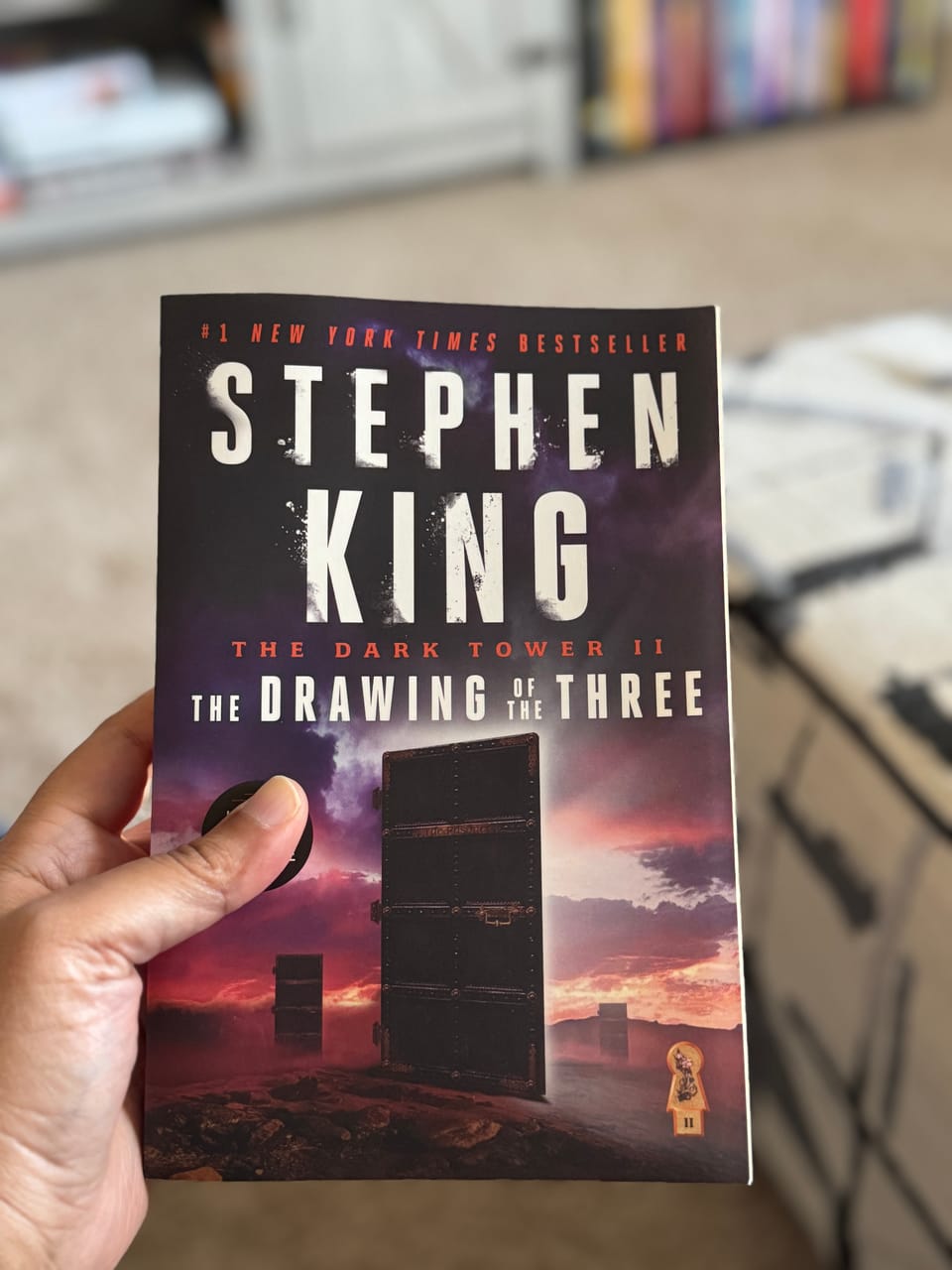The Drawing of the Three by Stephen King

This book picks up right after the first book. Roland continues his journey to the Tower, but he gathers a couple of companions on his way. They all are forced to overcome challenges both internally and externally. The themes explored are transformation, purpose, and how we confront challenges.
Where to Find Reviews:
📚 Related Books
🥰 Who Would Like It?
This is a character-driven story and not a plot-driven story. it is not a Western like the last book but is more fantasy and action. If you were on the fence regarding the first book, I can see why more people enjoy this book.
Highlights and Notes
Without thought, with the simple resolve that had made him the last of them all, the last to continue marching on and on long after Cuthbert and the others had died or given up, committed suicide or treachery or simply recanted the whole idea of the Tower; with the single-minded and incurious resolve that had driven him across the desert and all the years before the desert in the wake of the man in black, the gunslinger stepped through the doorway. (Page 31)
No, sugar was not cocaine, but Roland could not understand why anyone would want cocaine or any other illegal drug, for that matter, in a world where such a powerful one as sugar was so plentiful and cheap. (Page 108)
There are people who need people to need them. The reason you don't understand is because you're not one of those people. You'd use me and then toss me away like a paper bag if that's what it came down to. God fucked you, my friend. You're just smart enough so it would hurt you to do that, and just hard enough so you'd go ahead and do it anyway. You wouldn't be able to help yourself. If I was lying on the beach there and screaming for help, you'd walk over me if I was between you and your goddam Tower. Isn't that pretty close to the truth?" (Page 187)
If you have given up your heart for the Tower, Roland, you have already lost. A heartless creature is a loveless creature, and a loveless creature is a beast. To be a beast is perhaps bearable, although the man who has become one will surely pay hell's own price in the end, but what if you should gain your object? What fyou should, heartless, actually storm the Dark Tower and win it? If there is naught but darkness in your heart, what could you do except degenerate from beast to monster? To gain one's object as a beast would only be bitterly comic, like giving a magnifying glass to an elephaunt. But to gain one's object as a monster... To pay hell is one thing. But do you want to own it? (Page 258)
🧠 Thoughts
Initial Thoughts
This book picks up right after the first book ends. We are told it is less than 7 hours later, but it's important to remember that time is funny in this book. We are also introduced to the lobster-like creatures who maim Roland.
Last Thought
The end of the book is kind of anticlimactic to me. It builds and builds and then fizzles out.
Characters
- Roland
- morally grey and not a traditional hero
- makes it clear a few times that he is willing to sacrifice any and everybody for his quest of the Tower
- there does seem to be a softening of him as he cares about his companions but knows he will let them die for his goal
- single-minded
- Eddie
- Drug-addicted screwup from the late 1980s New York.
- He was tasked with moving drugs for Balaazar.
- He seems intelligent deep down.
- He is very dependent on his older brother and transfers that devotion to Roland even though he continues to threaten to kill Roland
- provides the humor
- Odetta/Detta/Susannah
- Black woman from 1960s NY who is wheel chair bound
- wealthy and involved in the Civil Rights Movement
- Was attacked twice which may of caused Detta's emergence
- Detta is bitter and violent
- she is a cartoonish character who leans into the worst stereotypes of black women
- Susannah is a combination of the two
- the character is smart and capable and has her own identity
- Jack Mort
- a CPA and his hobby is killing
- he enjoys having a butterfly effect on those he kills or hurts
- those around him are cautious but do not understand why
- i was surprised by his lack of composure compared to the others
Conflict
- Internal
- Roland: duty vs connection and guilt which impacts emotional connections
- Eddie: addiction, self worth, and guilt
- Susannah: split personality
- External
- The Dark Tower itself because it looms over Rolands decisions and how he interacts with the world around him
- the doors between worlds as Roland experiences different challenges in a foreign world to draw his companions
- the environment
- Balazaar and addiction
- how the two personalities interact with the world
Context
- The way the doorway is described is pretty cool
- I’m not 100% sure of the rules, but neither are the characters.
- The story takes place mainly on the beach, but each door opens to a different time in New York
- it is a stark contrast between the desolate world Roland inhabits and the world Eddie and Susannah inhabit
Craft
- The book didn't answer the questions from the last book, but I do think it more fully sets up the rest of the series than the first book
- There were a couple of points that seemed to slow the story down
